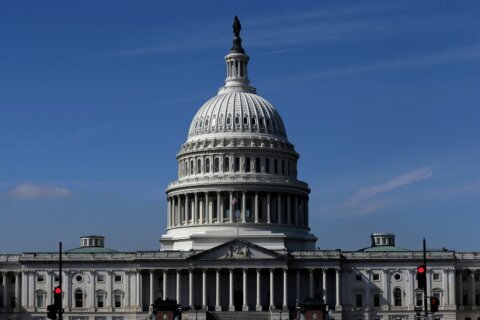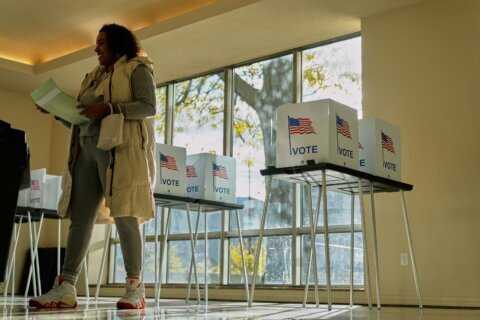Welcome back to WTOP’s weekly election update! WTOP’s team of reporters will keep you informed on the latest through November as primary and election races heat up in the District, Maryland, Virginia and nationwide. This week’s edition covers Tuesday’s primaries in Virginia and D.C., with the help of WTOP’s Luke Lukert and Mike Murillo.
Virginia and Maryland | Nick Iannelli
Virginia primaries set up big league races
There were a handful of primaries in Virginia U.S. House races this past week, but the political eyes nationally were on just two congressional districts in the state.
They were the 2nd and 7th districts, which feature vulnerable Democratic incumbents whom Republicans are eager to take on, hoping to pick up a couple of seats in November.
“Both of these districts are potentially winnable by either party,” said Stephen Farnsworth, a political-science professor with the University of Mary Washington.
In the 2nd District, which covers the Virginia Beach area, State Sen. Jen Kiggans won a Republican primary by defeating three opponents and will face Democratic Rep. Elaine Luria in November’s general election.
“The Republican selection of Kiggans creates a very, very competitive and challenging environment for congresswoman Luria,” said Farnsworth.
In the 7th District, which includes parts of Prince William, Stafford, Spotsylvania and Culpeper counties, Prince William County Supervisor Yesli Vega defeated five opponents to win a Republican primary.
Vega will face Democratic Rep. Abigail Spanberger.
“Both of those districts are going to be very prominent with national donors and the national party organizations of both parties,” Farnsworth said.
Significant endorsements in Maryland governor’s race
Bestselling author Wes Moore, a Democratic candidate in Maryland’s crowded race for governor, picked up a couple of key endorsements ahead of the July 19 primary election.
State Senate President Bill Ferguson and U.S. Rep. Kweisi Mfume threw their support behind Moore.
Ferguson and Mfume are both influential leaders in the Baltimore region, hailing “from a battleground region that has been critical in launching candidates to victory in November,” The Washington Post said.
The race is anybody’s game, as polls have shown a huge number of undecided voters across the state.
Wrong ballots go out in Prince George’s County
About 10,000 voters in Prince George’s County received sample ballots for July’s primary elections that had incorrect candidate information for their districts.
While sample ballots are not used to vote, they do contain important information regarding voting locations and a list of candidates who will appear on peoples’ ballots when they do vote.
Voters who received the incorrect sample ballots have not been contacted by the county’s board of elections, but corrected ballots are supposed to be distributed late next week.
Those with questions should call the board of elections at 301-341-7300.
The DC primary | Mike Murillo and Luke Lukert
With crime rates up in D.C., Tuesday’s primary was expected in part to be a referendum on what Democrats in the District think about Mayor Muriel Bowser’s action to address the issue so far. In the end, Bowser carried the four-candidate primary, with a 12% percent lead over At-Large Council member Robert White, who was seen as more progressive. Bowser, if elected in November, would become the first mayor since Marion Berry to serve three terms.
The race for D.C. attorney general attracted a lot of attention, largely as a result of what happened weeks before the election. Ward 5 Council member Kenyan McDuffie was found ineligible to run for the post after a challenge by candidate Bruce Spiva. That challenge left a cloud over the race, as Spiva, Brian Schwalb and Ryan Jones continued to campaign for the blessings of Democrats. In the end, Schwalb, who had been endorsed by outgoing AG Karl Racine, claimed the victory.
Overall, it was a good night for incumbents: Council Chair Phil Mendelson, At-Large Council member Anita Bonds, Ward 1 Council member Brianne Nadeau and longtime congressional delegate Eleanor Holmes Norton got the nod from Democrats.
Two of Tuesday’s council primaries didn’t have incumbent candidates, and both went to candidates seen as more progressive among Democrats: In Ward 3, Matthew Frumin was chosen to succeed Council member Mary Cheh; in Ward 5, D.C. State Board of Education Rep. Zachary Parker defeated former Council member Vincent Orange, among others, to succeed McDuffie, who gave up the seat to run for attorney general.
Ward 6 Council member Charles Allen ran unopposed in the primary.
While several Republicans and independents intend to run for open positions such as mayor, Democratic primaries historically serve as a crystal ball for who will end up succeeding in the general election.
— Mike Murillo
At the Bowser celebration
The celebration at Mayor Muriel Bowser’s campaign party Tuesday didn’t culminate until hours after her projected win came down. There was slight cheering as the early results came in around 8:30 p.m.; five minutes later, Bowser was projected to take her third Democratic nomination. A staffer came up to me a short time later and asked if there were any results — I had to inform him that Bowser was already projected to win.
Two hours later, the mayor took the stage at Franklin Hall with supporters at her back and D.C. Rep. Eleanor Holmes Norton at her side.
“Today, I stand in the footsteps of Marion Barry,” Bowser exclaimed to the screaming crowd.
During her 15-minute speech she thanked staff and supporters, and reminded the crowd of many of her campaign promises including police support for safer streets, tackling homelessness across the city — and, of course, statehood.
“We chose a future where we demand to be the 51st state,” Bowser said.
— Luke Lukert
Video of the Week
Mayor Bowser gets a congratulatory phone call from Vice President Kamala Harris. (WTOP/Kristi King)
This video is no longer available.
From Capitol Hill | Mitchell Miller
Trump endorsements lose some luster
Former President Donald Trump can say that he endorsed Katie Britt, who won the GOP U.S. Senate runoff in Alabama, but he was a latecomer to her campaign. Trump had initially enthusiastically endorsed Rep. Mo Brooks in the race.
After reports that Brooks’ campaign was struggling, and after Brooks indicated he was ready to move on from baseless claims of 2020 election fraud, Trump pulled his endorsement and said he supported Britt.
But Britt had support from at least 10 Republican U.S. senators, including her former boss, Sen. Richard Shelby. Britt was a former chief of staff for Shelby and had plenty of political and financial support, without Trump’s backing.
She beat Brooks by more than 25 percentage points and will be the favorite in the fall election against Democrat Will Boyd.
In Georgia, two GOP congressional candidates endorsed by Trump lost their primaries.
Rich McCormick beat Trump-backed candidate Jake Evans by more than 30 percentage points. And Mike Collins crushed Vernon Jones — another candidate supported by Trump — getting nearly three times as many votes.
The Trump effect down-ballot
While former President Trump has had mixed results with his endorsements in U.S. Senate and House races, he continues to have an impact on races for secretary of state.
Consider the winner of the Alabama GOP race for that important position, which oversees elections: State Rep. Wes Allen, who was endorsed by Trump’s friend Mike Lindell, the election denier and MyPillow founder, won a Republican runoff.
Allen has questioned the legitimacy of the 2020 presidential election, as a member of the America First Secretary of State Coalition.
Allen defeated outgoing State Auditor Jim Zeigler, who also promotes tighter voting guidelines, but doesn’t go as far as Allen.
Among Allen’s positions: opposition to early voting and no-excuse absentee ballots.
While Trump’s endorsements in congressional races get the most attention, his greatest impact may be on how many state Republicans continue to push for more voting restrictions and ignore the more than 60 court rulings that found no widespread fraud in the 2020 election.
The Washington Post found that more than 100 Republican nominees nationwide have bought into Trump’s lies about the 2020 election.
Fake electors and Jan. 6
Among the revelations from one of the Jan. 6 committee hearings this week are the texts that indicate U.S. Sen. Ron Johnson, R-Wis., sought the hand delivery of certificates for fake electors to former Vice President Mike Pence.
The texts included an exchange between Johnson’s chief of staff and Pence’s legislative director, suggesting an “alternate slate of electors” for Wisconsin and Michigan.
While not valid, they would have been used to try to overturn the will of voters in the two states, which Joe Biden won.
Pence’s staffer, Chris Hodgson, texted back, “Do not give that to him.”
Johnson has sought to downplay the extraordinary finding, telling a CNN reporter he was “not involved in this at all.”
But fellow Wisconsin Sen. Tammy Baldwin, a Democrat says, Johnson bought into “Trump’s conspiracy” about the 2020 election and tried to overturn the will of voters in their state.
All four Democratic Senate candidates running against Johnson have called for his resignation.
“He literally tried to hand Mike Pence fake ballots,” Lt. Gov. Mandela Barnes said in a statement. “Once again, Ron Johnson has proven he’s a danger to our country and our fundamental rights.”
Worth your time
From Nick Iannelli
- Maryland candidates for governor talk about plans for their first 100 days.
- Bowser seeks to follow Marion Barry, but some Black voters are skeptical.
- Youngkin’s speech in Nebraska has been seen as a testing of the waters for a presidential run.
From Mitchell Miller
- How much do you save from a gas tax holiday?
- A look at the politics of crime.
- A good reminder about political polls.
Dates to know
- June 28: The deadline to register to vote in Maryland.
- July 19: Primary day in Maryland.









